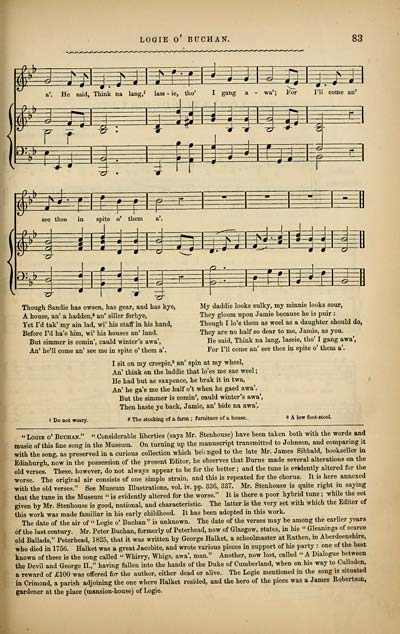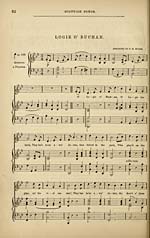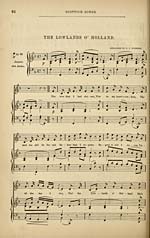Inglis Collection of printed music > Printed music > Songs of Scotland adapted to their appropriate melodies > Volume 1
(99) Page 83
Download files
Complete book:
Individual page:
Thumbnail gallery: Grid view | List view

LOGIE BUCHAN.
83
mm
=*:
3=
*S
r
p^^i^p
BIS
?=m
?
-*—fc=i=i
=P^=i
a'. He said, Think na lang, 1 lass - ie, tho' I gang a - wa'; For I'll come an'
-e-
T
gf^Ff^
see thee in spite o' them
i3d
SE^
^E
^m
as
^
I^IIIeI
Though Sandie has owsen, has gear, and has kye,
A house, an' a hadden,* an' siller forbye,
Yet I'd tak' my ain lad, wi' his staff in his hand,
Before I'd ha'e him, wi' his houses an' land.
But simmer is comin', cauld winter's ana',
An' he'll come an' see me in spite o' them a'.
My daddie looks sulky, my niinnie looks sour,
They gloom upon Jamie because he is puir :
Though I lo'e them as weel as a daughter should do,
They are no half so dear to me, Jamie, as you.
He said, Think na lang, lassie, tho' I gang awa',
For I'll come an' see thee in spite o' them a'.
1 Do not weary.
I sit on my creepie, 3 an' spin at my wheel,
An' think on the laddie that lo'es me sae weel ;
He had but ae saxpence, he brak it in twa,
An' he ga'e me the half o't when he gaed awa'.
But the simmer is comin', cauld winter's awa',
Then haste ye back, Jamie, an' bide na awa'.
* The stocking of a farm ; furniture of a house.
3 A low foot-stool.
« Loon; o* Buchan." " Considerable liberties (says Mr. Stenhouse) have been taken both with the words and
music of this fine song in the Museum. On turning up the manuscript transmitted to Johnson, and comparing it
with the song, as preserved in a curious collection which bel. nged to the late Mr. James Sibbald, bookseller in
Edinburgh, now in the possession of the present Editor, he observes that Burns made several alterations on the
old verses. These, however, do not always appear to be for the better ; and the tune is evidently altered for the
worse. The original air consists of one simple strain, and this is repeated for the chorus. It is here annexed
with the old verses." See Museum Illustrations, vol. iv. pp. 336, 337. Mr. Stenhouse is quite right in saying
that the tune in the Museum " is evidently altered for the worse." It is there a poor hybrid tune ; while the set
given by Mr. Stenhouse is good, national, and characteristic. The latter is the very set with which the Editor of
this work was made familiar in his early childhood. It has been adopted in this work.
The date of the air of " Logie o' Buchan " is unknown. The date of the verses may be among the earlier years
of the last century. Mr. Peter Buchan, formerly of Peterhead, now of Glasgow, states, in his " Gleanings of scarce
old Ballads," Peterhead, 1825, that it was written by George Halket, a schoolmaster atRathen, in Aberdeenshire,
who died in 1756. Halket was a great Jacobite, and wrote various pieces in support of his party : one of the best
known of these is the song called " Whirry, Whigs, awa', man." Another, now lost, called » A Dialogue between
the Devil and George II.," having fallen into the hands of the Duke of Cumberland, when on his way to Culloden,
a reward of £100 was offered for the author, either dead or alive. The Logie mentioned in the song is situated
in Crimond, a parish adjoining the one where Halket resided, and the hero of the piece was a James Robertson,
gardener at the place (mansion-house) of Logie.
83
mm
=*:
3=
*S
r
p^^i^p
BIS
?=m
?
-*—fc=i=i
=P^=i
a'. He said, Think na lang, 1 lass - ie, tho' I gang a - wa'; For I'll come an'
-e-
T
gf^Ff^
see thee in spite o' them
i3d
SE^
^E
^m
as
^
I^IIIeI
Though Sandie has owsen, has gear, and has kye,
A house, an' a hadden,* an' siller forbye,
Yet I'd tak' my ain lad, wi' his staff in his hand,
Before I'd ha'e him, wi' his houses an' land.
But simmer is comin', cauld winter's ana',
An' he'll come an' see me in spite o' them a'.
My daddie looks sulky, my niinnie looks sour,
They gloom upon Jamie because he is puir :
Though I lo'e them as weel as a daughter should do,
They are no half so dear to me, Jamie, as you.
He said, Think na lang, lassie, tho' I gang awa',
For I'll come an' see thee in spite o' them a'.
1 Do not weary.
I sit on my creepie, 3 an' spin at my wheel,
An' think on the laddie that lo'es me sae weel ;
He had but ae saxpence, he brak it in twa,
An' he ga'e me the half o't when he gaed awa'.
But the simmer is comin', cauld winter's awa',
Then haste ye back, Jamie, an' bide na awa'.
* The stocking of a farm ; furniture of a house.
3 A low foot-stool.
« Loon; o* Buchan." " Considerable liberties (says Mr. Stenhouse) have been taken both with the words and
music of this fine song in the Museum. On turning up the manuscript transmitted to Johnson, and comparing it
with the song, as preserved in a curious collection which bel. nged to the late Mr. James Sibbald, bookseller in
Edinburgh, now in the possession of the present Editor, he observes that Burns made several alterations on the
old verses. These, however, do not always appear to be for the better ; and the tune is evidently altered for the
worse. The original air consists of one simple strain, and this is repeated for the chorus. It is here annexed
with the old verses." See Museum Illustrations, vol. iv. pp. 336, 337. Mr. Stenhouse is quite right in saying
that the tune in the Museum " is evidently altered for the worse." It is there a poor hybrid tune ; while the set
given by Mr. Stenhouse is good, national, and characteristic. The latter is the very set with which the Editor of
this work was made familiar in his early childhood. It has been adopted in this work.
The date of the air of " Logie o' Buchan " is unknown. The date of the verses may be among the earlier years
of the last century. Mr. Peter Buchan, formerly of Peterhead, now of Glasgow, states, in his " Gleanings of scarce
old Ballads," Peterhead, 1825, that it was written by George Halket, a schoolmaster atRathen, in Aberdeenshire,
who died in 1756. Halket was a great Jacobite, and wrote various pieces in support of his party : one of the best
known of these is the song called " Whirry, Whigs, awa', man." Another, now lost, called » A Dialogue between
the Devil and George II.," having fallen into the hands of the Duke of Cumberland, when on his way to Culloden,
a reward of £100 was offered for the author, either dead or alive. The Logie mentioned in the song is situated
in Crimond, a parish adjoining the one where Halket resided, and the hero of the piece was a James Robertson,
gardener at the place (mansion-house) of Logie.
Set display mode to: Large image | Transcription
Images and transcriptions on this page, including medium image downloads, may be used under the Creative Commons Attribution 4.0 International Licence unless otherwise stated. ![]()
| Special collections of printed music > Inglis Collection of printed music > Printed music > Songs of Scotland adapted to their appropriate melodies > Volume 1 > (99) Page 83 |
|---|
| Permanent URL | https://digital.nls.uk/94708160 |
|---|
| Shelfmark | Ing.127 |
|---|---|
| Additional NLS resources: | |
| Attribution and copyright: |
|
| Description | Scottish and English songs, military music and keyboard music of the 18th and 19th centuries. These items are from the collection of Alexander Wood Inglis of Glencorse (1854 to 1929). Also includes a few manuscripts, some treatises and other books on the subject. |
|---|
| Description | The Glen Collection and the Inglis Collection represent mainly 18th and 19th century Scottish music, including Scottish songs. The collections of Berlioz and Verdi collected by bibliographer Cecil Hopkinson contain contemporary and later editions of the works of the two composers Berlioz and Verdi. |
|---|

